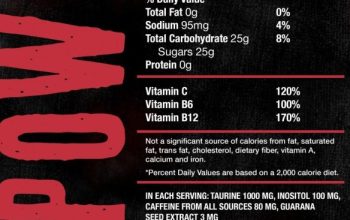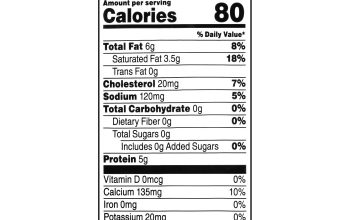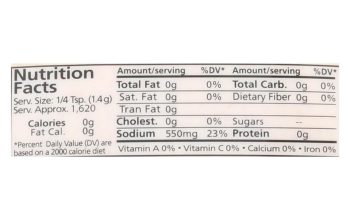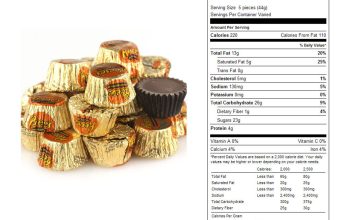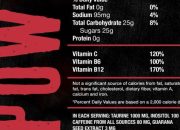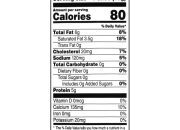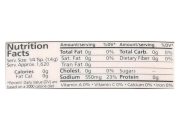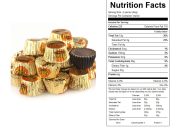Caloric Content and Serving Size: Devilled Eggs Nutrition Facts
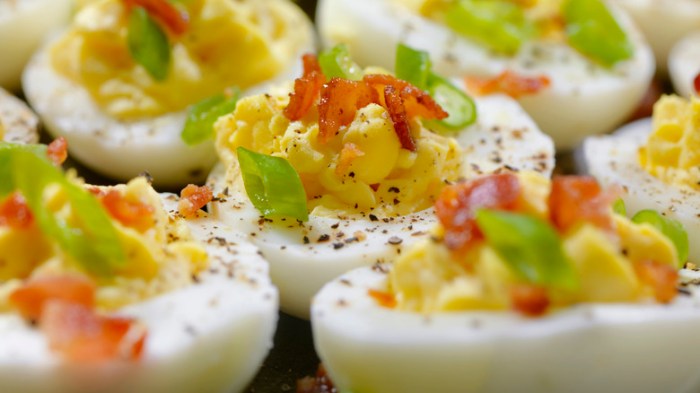
Devilled eggs nutrition facts – Deviled eggs, a classic appetizer, offer a delicious blend of creamy yolk and tangy filling. However, understanding their caloric content and how serving size impacts overall intake is crucial for mindful eating. This section will detail the calorie count per egg and for various serving sizes, considering the influence of different ingredients.The caloric content of a single deviled egg typically ranges from 70 to 100 calories.
This variation stems primarily from the type and amount of mayonnaise used, as well as any additions to the filling. A smaller deviled egg will naturally contain fewer calories than a larger one.
Calorie Count per Serving Size
The calorie count significantly increases with the number of deviled eggs consumed. For instance, two deviled eggs could contain between 140 and 200 calories, while three could range from 210 to 300 calories. Consuming six deviled eggs, a substantial portion, would yield a calorie intake between 420 and 600 calories. These figures provide a general range, and the precise calorie count depends on the specific recipe and ingredients used.
Ingredient Impact on Caloric Content
Different types of mayonnaise substantially affect the calorie count. Full-fat mayonnaise contributes significantly more calories than light or reduced-fat options. Adding ingredients like bacon or cheese increases the calorie density further. For example, using bacon bits will add roughly 30-50 calories per serving, while a significant amount of shredded cheese could add another 50-75 calories per egg. Conversely, opting for healthier additions such as chopped vegetables (like chives or celery) will minimally impact the overall calorie count.
Calorie Density Comparison
Understanding the calorie density of deviled eggs relative to other common appetizers helps in making informed choices.
- Deviled Eggs (1 egg): 70-100 calories. Relatively high calorie density for a small portion.
- Potato Chips (1 oz): Approximately 150 calories. Higher calorie density than a single deviled egg, but often a larger serving.
- Mini Quiches (1): Typically 100-150 calories, comparable to deviled eggs.
- Vegetable Sticks with Dip (1 cup): Around 50-80 calories, significantly lower calorie density than deviled eggs.
It’s important to note that these are approximate values and can vary based on specific brands and preparation methods. This comparison highlights that while deviled eggs are not exceptionally low-calorie, their caloric content is comparable to other common party snacks. Portion control remains key to managing overall calorie intake.
Health Benefits and Drawbacks
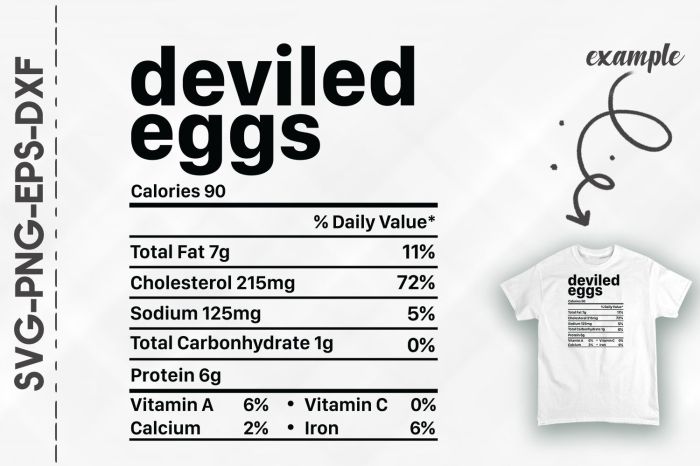
Deviled eggs, while undeniably delicious, present a complex nutritional picture. Moderation is key to reaping potential benefits while mitigating potential drawbacks. Understanding the nutritional profile and its implications is crucial for informed consumption.Deviled eggs offer a modest source of protein and several essential nutrients. The egg yolks provide choline, a nutrient vital for brain health and liver function.
They also contain lutein and zeaxanthin, antioxidants that support eye health. Hard-boiled eggs are a good source of vitamin D and selenium, both contributing to overall well-being. However, the addition of mayonnaise significantly alters the nutritional landscape.
Nutritional Composition and Health Implications, Devilled eggs nutrition facts
The nutritional content of deviled eggs is heavily influenced by the mayonnaise used. Full-fat mayonnaise significantly increases the caloric, fat, and cholesterol content compared to light mayonnaise. For example, a deviled egg made with full-fat mayonnaise might contain approximately 70-80 calories, 7-8 grams of fat, and 60-70mg of cholesterol, while a version made with light mayonnaise could reduce these figures to around 50-60 calories, 4-5 grams of fat, and 40-50mg of cholesterol.
These variations highlight the importance of ingredient selection in managing dietary intake.
Deviled eggs, a classic appetizer, offer a surprisingly varied nutritional profile depending on preparation. The fat content, for instance, can fluctuate significantly. For a contrasting perspective on processed snack foods, consider checking out the nutritional information on pizza rolls nutrition facts , which often reveal higher levels of sodium and saturated fat. Returning to deviled eggs, remember that portion control is key to managing their caloric intake.
Cholesterol and Saturated Fat Content
Deviled eggs, particularly those made with full-fat mayonnaise, are relatively high in cholesterol and saturated fat. High cholesterol intake is linked to an increased risk of heart disease in some individuals. Saturated fat contributes to raising LDL (“bad”) cholesterol levels. While dietary cholesterol’s impact on blood cholesterol is less significant than previously believed, individuals with high cholesterol or a family history of heart disease should consume deviled eggs sparingly.
The use of light mayonnaise or alternatives like avocado mayonnaise can help mitigate these concerns, reducing the overall saturated fat and cholesterol content.
Comparison of Mayonnaise Types
The type of mayonnaise significantly impacts the nutritional profile of deviled eggs. A table comparing full-fat and light mayonnaise versions illustrates this:
| Nutrient | Full-Fat Mayonnaise Deviled Egg (Approximate Values) | Light Mayonnaise Deviled Egg (Approximate Values) |
|---|---|---|
| Calories | 70-80 | 50-60 |
| Fat (grams) | 7-8 | 4-5 |
| Saturated Fat (grams) | 2-3 | 1-2 |
| Cholesterol (mg) | 60-70 | 40-50 |
Note: These values are estimates and can vary depending on the specific recipe and ingredients used.
Dietary Considerations
Deviled eggs, while delicious, require careful consideration for those following specific diets or managing certain health conditions. Understanding their nutritional profile allows for informed choices and appropriate modifications to accommodate various dietary needs and preferences. This section details how deviled eggs fit into different dietary plans and offers strategies for adapting recipes to reduce specific components.
Deviled Eggs and Dietary Restrictions
Deviled eggs, in their traditional form, present some challenges for certain diets. The ingredients—primarily hard-boiled eggs, mayonnaise, and seasonings—dictate their suitability.
- Low-Carb and Keto Diets: Deviled eggs are generally considered keto-friendly and low-carb. The primary carbohydrate source is from the egg yolks, which contain a relatively small amount of carbohydrates. A serving of two deviled eggs typically contains less than 2 grams of net carbs.
- Vegetarian Diets: Traditional deviled eggs are naturally vegetarian, as they contain no meat products.
- Vegan Diets: Traditional deviled eggs are not vegan. To make a vegan version, substitute the eggs with a vegan egg substitute and the mayonnaise with a vegan mayonnaise alternative. Aquafaba (chickpea brine) can be whipped to create a similar texture to egg whites, while various brands offer flavorful vegan mayonnaise options. Experimentation with different vegan substitutes may be necessary to achieve a similar taste and texture to the traditional recipe.
Modifying Deviled Egg Recipes
Adjusting a deviled egg recipe to reduce sodium, fat, or cholesterol involves making thoughtful substitutions and mindful portion control.
- Reducing Sodium: Use low-sodium mayonnaise and avoid adding extra salt during preparation. Consider using herbs and spices, such as paprika, garlic powder, or onion powder, to enhance flavor instead of relying solely on salt.
- Reducing Fat: Use a reduced-fat mayonnaise or consider incorporating a small amount of plain Greek yogurt into the yolk mixture to reduce the overall fat content. However, note that this will slightly alter the texture and richness of the final product.
- Reducing Cholesterol: Since cholesterol primarily comes from the egg yolks, reducing the number of yolks used in the recipe or using egg whites only will lower the cholesterol content. This will impact the richness and flavor of the deviled egg. Consider adding a small amount of avocado to increase the creaminess and improve texture when reducing yolks.
Visual Infographic: Dietary Considerations of Deviled Eggs
Imagine a visually appealing infographic divided into four sections, each representing a dietary consideration. Section 1: Low-Carb/Keto: This section would feature a graphic of two deviled eggs alongside text indicating their low-carb and keto-friendly nature. Data points like “Net Carbs: ~2g per serving” would be clearly displayed. A small image of avocado could be included as a supplementary healthy fat.
Section 2: Vegetarian: This section would use a simple illustration of a deviled egg with a checkmark to highlight its inherent vegetarian status. The text would state “Naturally Vegetarian.” Section 3: Vegan: This section would depict a vegan deviled egg, possibly using a different color palette to distinguish it. It would showcase the vegan substitutes: a vegan egg alternative and vegan mayonnaise, with descriptions of how to make the adaptation.
Section 4: Modifications: This section would visually represent adjustments to reduce sodium, fat, and cholesterol. Small icons (a salt shaker with a minus sign, a fat droplet with a minus sign, a cholesterol molecule with a minus sign) could accompany brief descriptions of modification strategies, such as using low-sodium mayonnaise or incorporating Greek yogurt. A small graphic representing portion control could also be included.
FAQ
Are deviled eggs a good source of protein?
Yes, deviled eggs offer a moderate amount of protein, primarily from the egg whites. The exact amount varies depending on the size of the eggs.
Can I make deviled eggs vegan?
While traditional deviled eggs use eggs, vegan versions can be made using tofu or a vegan egg substitute as a base, along with vegan mayonnaise.
How can I reduce the fat content in deviled eggs?
Use light mayonnaise or even a mixture of light mayonnaise and plain Greek yogurt to reduce fat content. Consider reducing the amount of added ingredients like bacon which are high in fat.
Are deviled eggs suitable for a low-cholesterol diet?
Deviled eggs are relatively high in cholesterol. Individuals on a low-cholesterol diet should consume them sparingly or choose lower-cholesterol alternatives.
How long can I store deviled eggs in the refrigerator?
Deviled eggs should be refrigerated and consumed within 2-3 days for optimal safety and quality.

